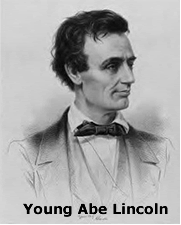The Rise of Abraham Lincoln
Copyright © 2005-6, Henry J. Sage

The rise of Abraham Lincoln reflects one of the myths of American history: that it is possible for a person to rise from the humblest of origins to the highest office in the land. That myth is rooted in considerable truth, for a number of American presidents have come from very modest backgrounds. On the other hand, that Lincoln would become president of the United States was somewhat unlikely in that in addition to his humble beginnings, Lincoln also suffered numerous failures in the course of his political life. He managed to overcome them, however, for which the nation can be grateful.
Despite the negative influences that might have prevented Abraham Lincoln from succeeding in life, he possessed many qualities that were bound to lead him upwards. Lincoln was a humble man who always understood his place in the scheme of things. He had a brilliant mind—he was a fine constitutional lawyer, an eloquent speaker, a more than competent historian, and a sensitive man who seldom held grudges or wished ill to others, even when they might have deserved it. He was a working man who was not afraid to pick up a shovel or axe when there was work to be done. He could be tough when necessary, but was never petty or mean. He was the kind and gentle man, a good husband and father, and on top of everything else he had a well-developed if somewhat earthy sense of humor.
Lincoln arrived on the national political scene in 1846, when he was elected to Congress. A political Whig, he opposed Democratic president James K. Polk's Mexican-American War. Polk’s justification for his incursion into Mexico was his claim that American blood had been shed on American soil. Lincoln introduced what were known as his “spot resolutions,” demanding to know from the president the exact spot on which blood had been shed; for American blood being shed on American soil was one thing, but American blood being shed on Mexican soil was something else. In the end the Mexican War was seen as a success, and Lincoln retired to Illinois with no chance of reelection.
He next sought the nomination for the Senate from Illinois in 1854 and the vice presidency on the ticket of the newly formed Republican Party in 1856, but he was unsuccessful in both endeavors. In 1858, in one of the most famous senatorial races ever, Lincoln debated the powerful Senator Stephen A. Douglas in seven lengthy meetings, only to lose the election. Since the debates were published in newspapers throughout the country, however, Lincoln became known far beyond the borders of Illinois and earned the nomination for president in 1860.
Lincoln's political philosophy can best be understood from his own life experiences and writings. As a young man he traveled down the Mississippi on a raft with a friend, and all along the way he observed the institution of slavery along the river banks where he rested on his trip to New Orleans. He soon came to see slavery as wrong, and fragments from his writings indicate that his opposition to slavery came early. Like most Americans of his time, however, Lincoln did not believe in full racial equality; but as he said in his debates with Judge Douglas, he believed that every man had the right to work in freedom.
As a lawyer familiar with the Constitution Lincoln fully understood the difficulties in trying to end slavery where it already existed, but he vigorously opposed its expansion beyond the existing slave states. He argued against the Kansas-Nebraska Act, he argued against the Supreme Court's decision in the Dred Scott case, and he argued that the government had the full right to prevent the spread of slavery into the territories. In has famous speech at the Cooper Union in New York in 1860 he laid out his position and attitudes toward slavery in great detail, even as he revealed his deep understanding of the situation created when slavery was recognized in the Constitution.
Lincoln assumed office during the worst crisis in American history. He was, in some ways, unprepared for the job; for example, he knew little of military strategy or tactics, and he had no experience in foreign policy save his brief involvement with the causes of the Mexican War while he was in Congress.
But Lincoln was a quick study, and he was humble enough to recognize his shortcomings and to work to overcome them, weighing and taking advice from any source he found credible. He was a brilliant politician who did not hesitate to surround himself with powerful men who sometimes opposed his policies. He proved to be a brilliant leader and manager even as he modestly refrained from asserting his authority just for the sake of showing that he had it. He knew when to pick and fight and when to back down, and above all, he was willing to do whatever it might take to save the Union he loved so dearly, even though the cost was immense.
The literature on Abraham Lincoln is Vast Below are several of the best books on Abraham Lincoln. Hundreds of others exist.
|
| Sage History |1850s Drift Toward War Home | The Civil War | Updated May 2, 2021 |